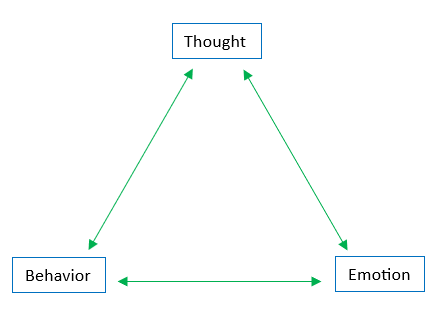
Your emotions have something to say. It is time to listen.
Table of Contents
Your emotions are like your own personal traffic signal. They inform you about a situation and guide your behavior. For everything.
I often hear, “I didn’t feel anything, I just did it.” Or “there wasn’t a feeling, just the thought to act.”
Sorry to disappoint all of you logical thinkers, but there is an emotion in there as well. It’s about learning to identify the cycle.

Dr. Joti Samra states, “emotions have wisdom.” They are informing you about something within your life, and it is important to be aware and listen to what they are saying. When you work on building awareness around your emotions, you will be able to respond more appropriately to situations.
The CBT triangle.

This is the CBT triangle. CBT stands for cognitive behavioral therapy. It’s a foundational therapeutic approach in the therapy world because so many pieces in therapy build off CBT concepts and the CBT triangle.
The CBT triangle shows how our thoughts, emotions, and behaviors are all connected. The arrows go each direction because it’s not one specific flow, but rather each part in the CBT triangle is influenced by the other.
You don’t have a behavior without a thought and an emotion. You don’t have an emotion without thoughts and a behavior. You don’t have a thought without an emotion and a behavior.
When you lack awareness of your emotions, you may find yourself as reactive, butting heads in conversations due to only applying the logic side of thinking, or feeling confused by some of your behavior and thought patterns. Tuning into your emotions is a fundamental piece in any therapeutic journey. Emotions are a building block in self-awareness, self-love, working through relationship difficulties, processing trauma, overcoming anxiety and depression, literally everything.
Emotions and cognitive processing.
A study review from 2017 found emotions as essential to cognitive processing, including, perception, attention, memory, reasoning, problem-solving, and learning. This is closely linked with the learning process. This is just another reason why knowing what your emotions are telling you is so important.
Lets look at anger for an example.
Perception and attention: You notice what made you angry.
Memory: You recognize it as something that either needs to be dealt with in the future or avoided.
Reasoning: You determine if you can do anything about it to ease your anger and resolve the situation.
Problem-solving: You identify the best course of action to alleviate your feelings of anger.
Learning: You understand why that made you angry.
What are your emotions telling you?

Happy: you may be enjoying this time and see it as important to you.
Sad: you may be holding onto something that you need to grieve and let go of.
Angry: you may feel like something is not fair and need to address it.
Anxious: you may feel the fight/flight/freeze response, and you need to determine if you can address and act on what is causing this emotion.
Guilt: maybe you did something wrong, and you need to make it right.
Disgust: you may need to avoid whatever is causing you to feel this emotion.
Surprise: something exciting may be happening and you need to direct your attention there.

Confusion: you may need to further explore something.
Embarrassment: you may have some insecurities about something you did. You can address and overcome those insecurities to ease embarrassment.
Empathy: you can relate to and connect with other’s experiences.
There are way more emotions than what is listed above, but this is a great list to get you started in tuning in and recognizing what your emotions are trying to tell you. Pay attention to what external factor triggered that emotion because it can help give you clues to what emotion you may be feeling and why.
